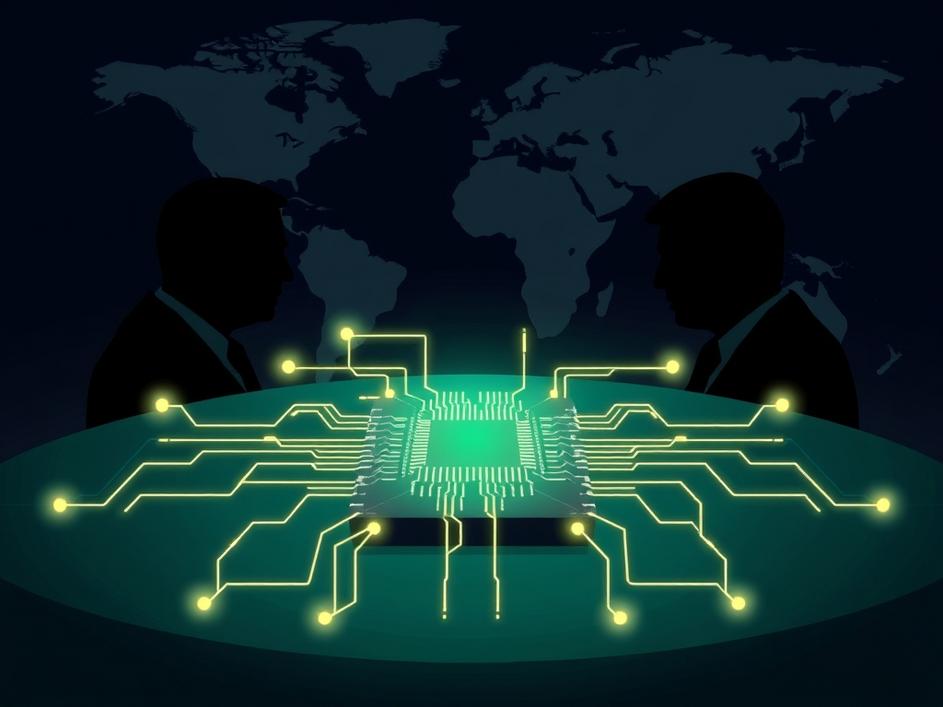


We are a digital agency helping businesses develop immersive, engaging, and user-focused web, app, and software solutions.
2310 Mira Vista Ave
Montrose, CA 91020
2500+ reviews based on client feedback

What's Included?
ToggleImagine the scene: two of the world’s most influential leaders, perhaps over a cup of tea, discussing not trade tariffs or peace treaties, but a tiny piece of silicon. It sounds a bit like a movie, doesn’t it? But that’s exactly what might happen. Recent news suggests that former U.S. President Donald Trump is open to talking about a specific, very powerful computer chip – Nvidia’s Blackwell – with Chinese President Xi Jinping. This isn’t just some tech gossip; it’s a huge signal about how much advanced technology, especially artificial intelligence, has moved from the back rooms of Silicon Valley right into the top tier of global politics. For years, we’ve watched as the tech race between the US and China heated up. Now, it seems a single ‘super-duper’ chip could be a central point of conversation, highlighting how critical these digital brains are to national power and future progress.
So, what exactly is this Blackwell chip that’s getting so much attention? Without getting bogged down in technical jargon, think of it as the engine for the next generation of artificial intelligence. It’s not just powerful; it’s designed to handle the incredibly complex calculations needed for things like advanced AI models, deep learning, and even scientific simulations. These aren’t just for making smarter phones. We’re talking about the backbone for self-driving cars, groundbreaking medical discoveries, sophisticated defense systems, and entire new industries. Countries that can build, access, and use these chips effectively will have a massive edge in developing future technologies. It’s like having the fastest supercomputer at your fingertips. The ability to process data at such an extreme level isn’t just about economic growth anymore; it’s deeply tied to national security and global influence. So, when a leader mentions a specific chip by name, you know it’s not just a passing thought; it’s about something big.
Why would a former U.S. President even consider bringing up a computer chip with the leader of China? It’s all about control and strategic advantage. The United States has been increasingly focused on limiting China’s access to advanced chip technology. The idea is to slow down China’s progress in AI and other cutting-edge areas, which are seen as critical for both economic competitiveness and military strength. By discussing the Blackwell chip, it shows how central these components are to the larger tech rivalry. It’s a clear indicator that the ability to design and manufacture these chips isn’t just a business matter for companies like Nvidia; it’s a key part of international relations. The conversations between leaders aren’t just about abstract policies; they’re about very tangible, very powerful pieces of hardware that dictate who leads in the next wave of innovation. This isn’t just a trade dispute; it’s a battle for technological supremacy, played out chip by chip.
For China, gaining access to these high-end chips is a top priority. They want to develop their own powerful AI capabilities, and right now, they still rely heavily on foreign designs and manufacturing for the most advanced components. Restrictions on access force them to invest heavily in their domestic chip industry, but that takes time and immense resources. For the U.S., the goal is to maintain its lead and ensure that cutting-edge technology doesn’t fall into the ‘wrong hands’ or get used in ways that go against its interests. This delicate balance creates a lot of tension. Companies like Nvidia are caught in the middle, trying to navigate complex regulations while still doing business in a massive global market. The outcome of these high-level discussions, or even just the willingness to have them, will shape not only the future of AI development in both countries but also the entire global supply chain for advanced technology. It means that every decision made about a chip has ripple effects felt around the world, from factories to research labs.
Even if Trump and Xi do discuss the Blackwell chip, what does that really mean for the future? It’s unlikely to result in an immediate, dramatic shift in policy. These discussions are more about gauging positions, sending signals, and perhaps exploring small openings for dialogue. But the very fact that such specific technology has risen to this level of diplomatic importance tells us a lot. It underscores that we are in a new era where technological leadership is inseparable from geopolitical power. This isn’t just a temporary phase; it’s the new reality. The global tech landscape will continue to be shaped by these strategic maneuvers, with countries vying for control over critical components, intellectual property, and talent. It forces us to think about how innovation will happen, who will benefit, and what kind of world emerges when the most powerful tools are also the most hotly contested. The conversation about a ‘super-duper’ chip is really a conversation about who controls the future.



Comments are closed